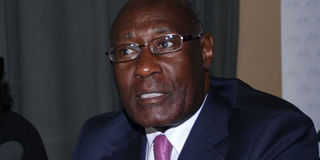Kabage: City lawyer with candid planning views

Lawyer and business Karanja Kabage, who died after a road accident near his Karen home in Nairobi on July 5, 2019. PHOTO | FILE | NATION MEDIA GROUP
What you need to know:
- He quickly impressed me with his generosity of opinions on how to tackle Nairobi’s myriad planning woes.
- Recent urban management support programmes have focused on fiscal management and effective delivery of urban services, but still retain a top-down identity.
Karanja Kabage, the celebrated city lawyer and businessman, died on July 5. We met at the University of Nairobi auditorium lobby during the Nation Leadership Forum on affordable housing in September last year. He quickly impressed me with his generosity of opinions on how to tackle Nairobi’s myriad planning woes.
He gave me his card and I promised to seek appointment. I rue the opportunity I missed to drink from the fountain of wisdom that saw him comment on many of our socio-economic issues.
“The biggest challenge we have in Nairobi is that no one owns the city. Nairobi's ownership should be categorical so that we create pride and responsibility as a means to restoring back its lost glory,” he quipped.
MODEST DEBATE
With that, we began a modest debate on the two perspectives of the city. His view, reminiscent of Gerald Frug’s 1980 article 'The City as a Legal Concept', is often espoused by capitalist land-based elites that conceive the city away from the crucial dimension of social structure.
I advanced the view of the 'city as a growth machine', a view that sociologist Harvey Molotch had postulated back in 1976.
In it, the urban settlement is conveyed as a political economy that balances key operative motivations: social, economic, political and spatial.
He told me he had lived in Nairobi since 1963 and could attest to seeing every truck of sand and lorry of stones that built over 90 per cent of the buildings in the CBD.
His last article, published posthumously (Sunday Nation, July 7, 2019), is a testimony to both his ideological persuasion and historical prowess.
In it he decried the fact that Jomo Kenyatta International Airport (JKIA) is being overtaken by regional airports yet “Kenya has the economic capacity and the brains to build a world-class airport that can accommodate major airlines and passenger traffic”.
TOURISM ASSEST
He cited Dubai, and observed that the Gulf city-state had absolutely nothing to compare with Nairobi in terms of tourism assets, business opportunities and strategic location, yet it had built itself to global prominence through world-class infrastructure facilities. His solution to the president is to move fast and use private capital to build awesome facilities befitting Nairobi’s future aspirations.
Kabage’s view is shared by former senator Kembi Gitura who—through the Constitution of Kenya (Amendment Bill) (No. 2) of 2016 — had sought to transfer the governance of Nairobi back to the national government and thus cease being a county. The president would then have the powers to appoint a Cabinet secretary to be in charge of the capital city.
I would have wished to engage the late lawyer a little on this view and a lot more on the disjuncture between local needs and global competitiveness that is at the heart of state re-scaling and urban governance.
However, suffice to say that since it’s the president he appealed to and private sector he recommended, it shows that there is still a monstrous chasm as far as Kenya’s urban governance—in terms of state-society relation—that the amended Cities and Urban Areas Act 2017 still struggles to remedy.
URBAN SERVICES
Kenya is in dire need of a new urban governance paradigm. Recent urban management support programmes have focused on fiscal management and effective delivery of urban services, but still retain a top-down identity.
In one of the most emblematic passages of democracy in America, Alexis de Tocqueville (1838) wrote, “The strength of free people resides in the town.
Town institutions are to liberty what primary schools are to knowledge... Without town institutions, a nation can pretend to have a free government, but it does not possess the spirit of liberty”.
Julius Coredo, Head of Programmes, at Habitat for Humanity Kenya.




